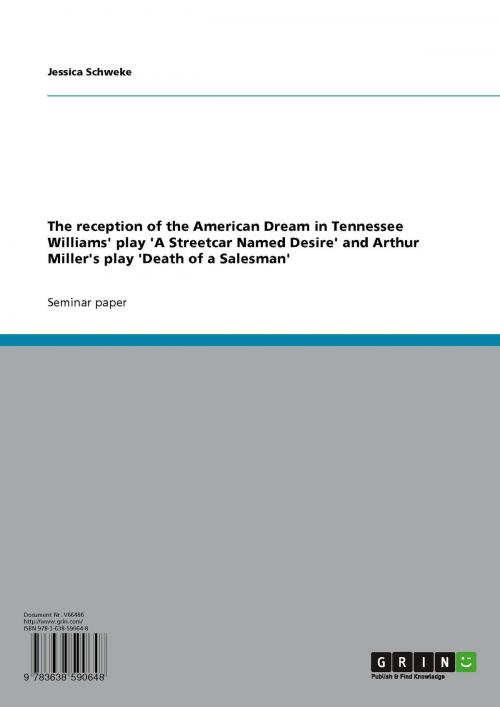The reception of the American Dream in Tennessee Williams' play 'A Streetcar Named Desire' and Arthur Miller's play 'Death of a Salesman'
Nonfiction, Entertainment, Drama, Anthologies| Author: | Jessica Schweke | ISBN: | 9783638590648 |
| Publisher: | GRIN Publishing | Publication: | January 12, 2007 |
| Imprint: | GRIN Publishing | Language: | English |
| Author: | Jessica Schweke |
| ISBN: | 9783638590648 |
| Publisher: | GRIN Publishing |
| Publication: | January 12, 2007 |
| Imprint: | GRIN Publishing |
| Language: | English |
Seminar paper from the year 2005 in the subject American Studies - Literature, grade: 1,0, Ernst Moritz Arndt University of Greifswald (Anglistik/Amerikanistik), course: Kurs '20th Century American Drama', 11 entries in the bibliography, language: English, abstract: This paper presents the perception of the idea of the American Dream in the two plays A Streetcar Named Desire from 1947 by Tennessee Williams and Death of a Salesman, written in 1949 by Arthur Miller. To find a suitable definition of the American Dream I mainly oriented my analysis around the works of America's founding fathers Thomas Jefferson and Benjamin Franklin as well as Hector St. John de Crèvecoeur, John Winthrop and James Truslow Adams. Based on these texts I transferred these factors on the plays by Williams and Miller and searched for differences and similarities. The following text will therefore be concerned firstly with a definition of the term 'American Dream' and the conversion of these notions in the characters Blanche DuBois and Stanley Kowalski in Tennessee Williams' drama A Streetcar Named Desire and in Willy Loman as well as his sons Biff and Happy in Arthur Miller's play Death of a Salesman.
Seminar paper from the year 2005 in the subject American Studies - Literature, grade: 1,0, Ernst Moritz Arndt University of Greifswald (Anglistik/Amerikanistik), course: Kurs '20th Century American Drama', 11 entries in the bibliography, language: English, abstract: This paper presents the perception of the idea of the American Dream in the two plays A Streetcar Named Desire from 1947 by Tennessee Williams and Death of a Salesman, written in 1949 by Arthur Miller. To find a suitable definition of the American Dream I mainly oriented my analysis around the works of America's founding fathers Thomas Jefferson and Benjamin Franklin as well as Hector St. John de Crèvecoeur, John Winthrop and James Truslow Adams. Based on these texts I transferred these factors on the plays by Williams and Miller and searched for differences and similarities. The following text will therefore be concerned firstly with a definition of the term 'American Dream' and the conversion of these notions in the characters Blanche DuBois and Stanley Kowalski in Tennessee Williams' drama A Streetcar Named Desire and in Willy Loman as well as his sons Biff and Happy in Arthur Miller's play Death of a Salesman.















